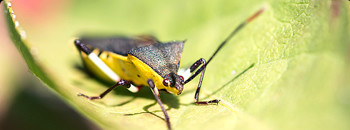Spring is here, and storm season started earlier than usual in the southern half of the United States. My husband, four children and I spent last Sunday picking up our backyard after thunderstorms blew the kids’ toys across the yard, and filled them with rainwater. It’s true that April Showers bring May flowers … and they also create ideal breeding conditions for mosquitoes.
Today is World Health Day. Whether having a barbecue or picking up toys after a storm, it’s easy to focus on what’s happening in our backyards and how that impacts our families. But what if I told you what’s happening in your backyard can impact your neighbors both near and far?
I spend much of my time educating the public on mosquito and other insect-related topics as an entomologist for Texas A&M AgriLife Extension. People are often surprised when I tell them their travels can have a wide-ranging health impact for their families and their neighbors. They’re even more surprised when I tell them that taking precautionary measures here at home is equally as important as when they travel.
We can help keep our families and local neighborhoods safe and healthy as well as our neighbors around the world. Here are some ways you can do your part today:
- Protect yourself and your family. This means applying EPA-approved mosquito-specific repellent, dumping standing water, wearing light-colored clothing, and safeguarding your home by ensuring your windows have screens and holes are repaired. You can learn more about protecting yourself and your family – including the easiest and most cost-efficient measures – on an earlier blog I wrote here.
- Know what’s happening around you. Check the Centers for Disease Control and Prevention website before you travel. The CDC provides travel alerts for countries throughout the world, as well as a list of necessary vaccinations or medications you should get before you go. For example, there is currently an outbreak of Yellow Fever in Brazil. While this strand of the disease typically impacts primates, vaccinations are underway in urban areas to prevent transmission and outbreaks in heavily populated areas.
- Take precautions before, during and after your travels. Don’t let your guard down when it comes to mosquito-borne illness protection. Whether going abroad, across the country or even a few hours away from home, the risk remains. Although the focus has recently been on Zika, other risks also exist. As of January, 47 states reported West Nile virus infections in people, birds and mosquitoes, according to the CDC. Stay informed about vector control. An integrated mosquito management approach will include surveillance, public awareness, and measures to prevent the spread of mosquito-transmitted diseases through controlled spraying and application.
On World Health Day and every day, let’s do our part to look out for each other. Take action to protect yourself and your family, but don’t stop there. Spread the word, stay informed, and remember that being proactive about mosquito control and prevention isn’t just good for you – it impacts our neighbors across the globe.
This is a guest post written by Sonja Swiger, PhD at Texas A&M AgriLife Extension.

